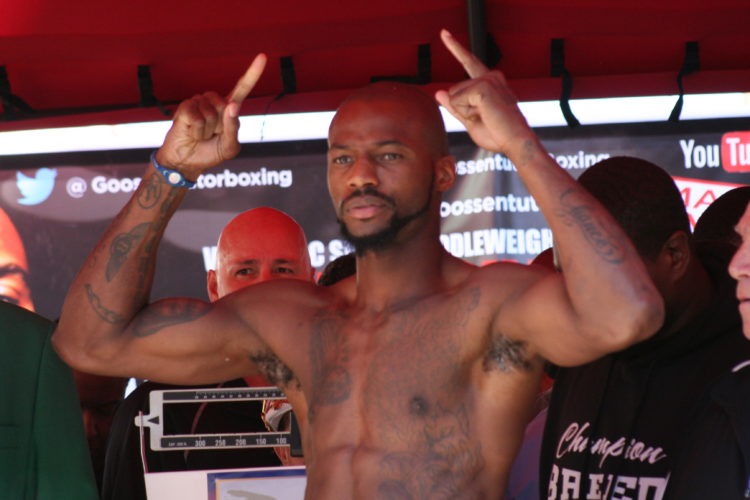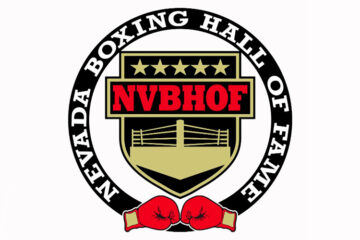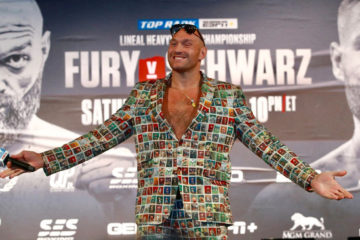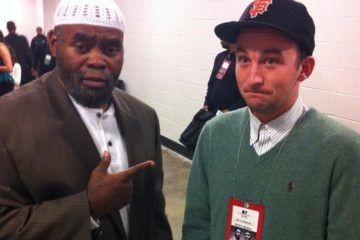The Reason Chad Dawson Is A Hall-Of-Fame Boxer
Chad Dawson is a hall-of-famer, there I said it.
Dawson might not have that sexy resume or even have a style that captured the imagination of the fans, but not unlike Larry Holmes, being good should mean something, and a dramatic loss to one of the best fighters of the past 40 years in Andre Ward, should be looked back upon as a willingness to compete and to Ward’s greatness rather than to Dawson’s inabilities on that given night, as I feel history is now looking upon it. Not just does it hurt Dawson’s legacy, it hurts fight fans in the future, as fighters will not be motivated to make interesting fights, as the risk will not match the reward.
For those not wanting to read this whole article the general thesis is this; if boxing is a sport that rewards achievement and in-ring excellence, Dawson should get in since he ruled the light heavyweight division from 2006-2011, and the fact that it wasn’t glamorous shouldn’t discount, what he did for four-to-five-years, that is if we, boxing, want to be taken seriously as a sport. That is a big IF, might I add.
Dawson, amassed 63 wins and 13 losses in the amateurs prior to turning professional in 2001 on the heels of becoming 2000 Unites National Champion Under-19 at 165 lbs., but it was a non-discrete amateur career, like an NBA player who didn’t play AAU ball or baseball player who went all four-years to college, but becomes an ace pitcher. Dawson is remarkable, in the sense, that despite, a lot of things being against him, he achieved, and often fought on the road against these hurdles.
Dawson would make his debut on a Main Events boxing card, Uncasville, Connecticut, not far from the fighters residency of New Haven, Ct. Dawson would work his way around the east coast circuit fighting on Main Events and CES Boxing cards establishing himself, fighting Carl Daniels, a man who fought Terry Norris, amongst other club level type of opposition as he looked to build his record up and get into profitable fights.
In 2005, as Dawson became a ten-round fighter, Dawson began fighting under Gary Shaw Promotions cards, one of which ended up on ShoBox: The Next Generation, as he stopped Ian Gardner, a tricky veteran, who only had two losses to world-class foes, Arthur Abraham and Peter Manfredo with the Manfredo bout being a disputed split decision in a four-round contest early in his career.
Stopping Gardner in the eleventh round proved to be a statement, one that propelled Dawson into a world title fight in 2007 against then-unbeaten Polish light heavyweight Tomasz Adamek for Adamek’s WBC light heavyweight world title which he won against Paul Briggs, and defended twice.
Dawson was viewed as an underdog heading into the bout, but after nine rounds, it was very one-sided in Dawson’s favor, as Dawson had controlled and tamed Adamek with good footwork, timing, and precision on his jab which negated Adamek’s ability to close distance on the taller and longer Dawson.
A trope of Dawson’s career was a bad tenth round, something that would follow him throughout his career, and Adamek would drop Dawson in this bout in the tenth round, but Dawson would hang on to win and would become the WBC light heavyweight world champion.
Despite being dominant, Dawson always seemed to look mortal in all of his big fights, despite winning, Dawson never had the moment that saw the fans favor him or relate to him as a beloved figure. Despite being one of the most dominant champions, and a fighter looking to face Roy Jones Jr, at some point, Dawson was the underground guy, that you had to buy Ring Magazines, when that mattered more prior to everything being on the internet, to see his ranking, status, and if he was booked for a fight coming soon.
Dawson would defend the title twice, against Jesus Ruiz and Epifanio Mendoza, stopping both of them before facing his next formidable foe, Glen Johnson, who was on the heels of knocking out Roy Jones Jr. and getting a split decision win over Antonio Tarver. It is important to note that prior to fighting Dawson, Tarver avenged that loss in a rematch.
Dawson would once again prove the superior boxer, but struggle with the pressure and high-guard style of Glen Johnson who took Dawson into deep waters as not unlike the Adamek fight, Dawson became less active in the bout in the later rounds. The bout seemed like a win for Dawson, but was regarded as one of the better fights of the year, and the dramatic comeback from Johnson had many favoring him over Dawson, which killed the moment in Dawson’s career which still was trending upward, but was flattening as opposed to ascending.
Prior to his bout with Antonio Tarver, Dawson vacated his WBC light heavyweight title that summer, as a fight with Tarver made more money and wouldn’t force him to have to go to on the road to face Adrian Diaconu, which didn’t appeal to the champion, and made far less money.
Dawson would have his first somewhat high-profile fight against Antonio Tarver, who had won three bouts since losing to Bernard Hopkins in a shocking upset in 2006. after Tarver had starred in the movie “Rocky Balboa”. Tarver, a brash trash talker sold the fight, and Dawson, even engaged in some banter as the typically mild-mannered fighter many had to come to expect saw Dawson being vocal about defeating Tarver.
Dawson would win obtaining his second world title of his career by getting the IBF light heavyweight world title and fight Tarver again in May of 2009. The rematch was very similar to the first fight as Dawson controlled the majority of the bout, Tarver had moments that had you wondering if Tarver would land the same punch that hurt Roy Jones Jr., years prior, but he didn’t.
After winning and defending his title against Antonio Tarver, Dawson, rematched Glen Johnson, a man who gave him a rough fight a year prior. Dawson defeated Johnson in a homecoming bout in Hartford, Ct, in a fight that was entertaining, but showed Dawson had adjusted from the bout prior.
Dawson had defied expectations and defeated three opponents over the course of five fights in which people had doubted if he would be upset. After long doubts, Dawson appeared to finally get his respect.
Ironically, his first career loss, was one when people finally started to back Dawson as the dominant light heavyweight world champion and he went on the road to Montreal to face Jean Pascal. Dawson started SLOW and that is an understatement. Dawson gave away round after round but came on late to nearly stop Pascal, but a cut forced the bout to go the scorecards in which Dawson’s early inactivity cost him the bout. Despite, a dominant run, Dawson was now without a title, a venue he could draw enormous revenue from a live gate and was a tough fight.
Essentially at the end of 2010, Chad Dawson was in the sport all good fighters with small fanbases never want to be, the good guy in a division with no leverage and fairly easy to avoid.
Oddly, despite losing most still looked at Chad Dawson as a capital G guy in the light heavyweight division, if not the guy, who just had serious motivation issues.
The following May of 2011, Dawson fought Adrian Diaconu, the man he was supposed to fight years prior, and defeated him by way of decision after a nine-month lay-off. The bout was in the same venue, The Bell Centre, as his loss to Pascal, and Dawson avenged some demons in the process.
That October, Dawson fought legendary middleweight Bernard Hopkins, who had redefined his career and moved up to light heavyweight knocking off contenders like Kelly Pavlik and Winky Wright in the process. The bout was on pay-per-view and did terribly both in terms of entertainment and revenue generated, as the fight was one of the ugliest to ever surface the sphere of the earth.
Dawson, who controlled the first round, threw Hopkins after Hopkins repeatedly clinched, this was oddly similar to when Robert “Rock” Allen threw Hopkins, years prior, leading to a no-contest. The same thing happened here, as the bout was originally ruled a technical knockout victory for Dawson, but later overturned to a no-contest.
The rematch, the following year, in 2012, was demoted to HBO, and no longer seen as a pay-per-view fight, and took place on Hopkins’ terrority of Atlantic City, New Jersey, not too far from Phildelphia, Pa, where Hopkins originates from, but with Dawson being a New England guy, had a solid backing as well.
Dawson put on his masterpiece as he out threw an aging legend in Bernard Hopkins as he exploited his youth, size, and speed against one of the best to ever do it, to earn a career-defining victory that never gets mentioned for how big of a win it was for Dawson, as Hopkins continued to win after this bout defeating Jean Pascal and Tavoris Cloud afterward.
After the bout, Dawson called out the best 168 lbs fighter in the world Andre Ward, even saying he would drop down to 168 lbs to fight Ward, a promise Ward made him keep.
Ward and Dawson would do battle in September of 2012 at the Oracle Arena, and I was there. The bout was similar to Floyd Mayweather versus Zab Judah in which you felt the winner of this bout was a bonafide superstar, and the loser would be written off, which is exactly what happened.
Dawson, who had trained with Dan Birmingham, Floyd Mayweather Sr, and Emmanuel Stewart, had enlisted “Iceman” John Scully in 2011 prior to the Hopkins bout.
During the build-up to this fight, rumors circulated that former world title challenger Edison Miranda had knocked out Dawson in training camp. Miranda’s trainer, Miguel Diaz would later confirm the story to BoxingScene.com‘s Rick Reeno on September 12th of that year.
Between a tough training camp, issues arising around Dawson motivation in camp to push to extremes, and Andre Ward channeling his inner Roy Jones Jr landing leaping left hooks on Dawson who keep his hand low. Ward was headed for greatness, and Dawson just looked helpless in a battle of two of the best pound-for-pound fighters. That being said, people often forget Dawson won the very first round of that fight.
Dawson’s career would continue to be weird as despite losing to Ward, Dawson still had the WBC light heavyweight world title, as he fought for Ward’s WBC and WBA super middleweight titles. Dawson would fight Adonis Stevenson in the Bell Centre in Montreal, a place he is probably sick of by now, as two of his worst losses were there, to get stopped in a single round by Adonis Stevenson. This win would in large part put Stevenson on the path to be many media outlets fighter of the year in 2012.
From this point on Dawson’s career is frustrating. A decision loss to Tommy Karpency in a bout that Dawson shouldn’t have allowed being as close as it was, being well ahead on the scorecard only to get stopped by Andrzej Fonfara in the tenth and final round, all of these losses, allowed people to take away from Dawson’s years of dominance.
How to remember Dawson
Dawson is a fighter who will be easy to dismiss especially in time because though time heals old wounds, it doesn’t add context to a timeframe. Dawson was not a fighter many choose to fight, and when people did he had to jump at the chance. Dawson went on the road, faced those that he could as well as was frozen out of some fights in the prime years of his career.
Dawson was a tricky southpaw, who could keep you at the end of his punches, but if you got defensively lack would up his work rate and punish his foes. The only real blemish on Dawson’s career is losing to Andre Ward, who is one of the best boxers to have ever been in the ring.
Dawson, a tremendous fighter who was a master of fighting from the outside and controlling range, as well as controlling the tempo of the bout.
As of the time of this writing Chad Dawson had a career record of 36 wins and 5 losses with 19 of his wins coming by way of knockout.






